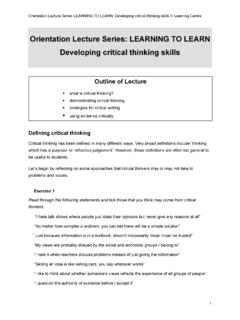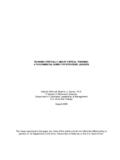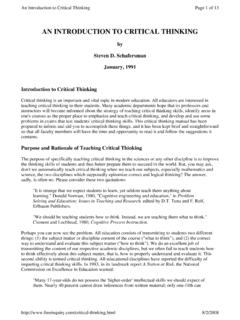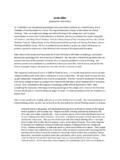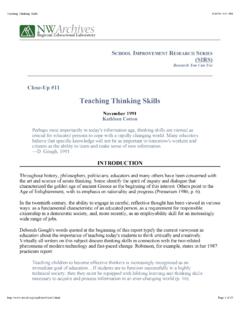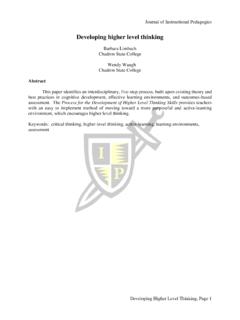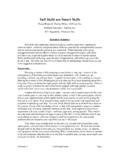Transcription of Developing Questioning Skills - Ecap
1 1 Section 5. Improving Specific Teaching TechniquesDeveloping Questioning SkillsKarron G. Lewis, for Teaching EffectivenessThe University of Texas at AustinThe ability to ask and answer questions is central tolearning. For more than two thousand years (since Socrates)the question has been an integral part of teaching. Onlywithin the last decade and a half, however, has extensiveresearch been directed to questions and Questioning strate-gies. The information which has been generated from thisresearch indicates that teachers largely have been asking thewrong questions. We have been focusing primarily onquestions regarding the specific information students pos-sessed rather than questions to promote use of Questioning Skills is essential to systematicinvestigation in any subject area.
2 In such an investigation 1)one asks questions to identify the reason or reasons for theinvestigation: 2) questions are asked to direct the search forinformation and to synthesize what has been discovered; and3) the conclusions resulting from investigations are evalu-ated via questions. However, using questions to assiststudents' investigations is a relatively new technique in theschools. In the past, teachers primarily questioned studentsto ascertain whether or not they were learning the bookcontent and to see if students were paying attention in shift in emphasis from learning solely content tolearning processes is to enable individuals to deal intelli-gently with their world and their lives. If students cananalyze their lives and the lives of others while in the schoolsetting, they will comprehend effectively their reality whenthey are outside the formal school situation.
3 Educationtoday aims at the creation of a rational being. A rationalbeing does not merely possess an effective memory; he/shemust be able to react to data. He/She must be able to thinkand he/she must be active in seeking an understanding should play a central role in the learningprocess. Because of this, we as teachers need to plan ourquestions carefully. This doesn't mean script writing; thatwould negate creative teaching. However, it does mean weneed to carefully plan our questions by thinking throughpossible questions which would guide the students towardfurther investigation and a deeper understanding of theconcepts being a teacher utilizes questions effectively, studentswill discover that the question is a very valuable learningtool.
4 It is a device through which they can organize theirthinking to achieve certain objectives. Students who askthemselves questions as they deal with various learningsituations will provide themselves with data and will de-velop an awareness of where there are deficits in data. Thistype of knowledge is essential if students are to assumemajor roles in their learning GuidelinesAlthough it is essential that teachers ask questionsthat bring out the educational goals they are seeking, there ismore to good Questioning technique than simply asking theproper question. The following principles were developedby Richard L. Loughlin and provide an excellent set ofguidelines for the teacher who wishes to develop goodquestioning of Questioning1.
5 Distribute questions so that all, including non-volun-teers, are Balance factual and thought-provoking Ask both simple and exacting questions, so that thepoorer students may participate and the brighter studentsmay be Encourage lengthy responses and sustained answers.(Avoid yes-no questions, questions overlaid with after-thoughts, fragmentary questions, and those that tug orencourage guessing. NOTE: If you catch yourselfasking a yes-no question, add "Explain.")5. Stimulate critical thinking by asking: "To what extent?""How?" "Under what circumstances?" "Why?" "Com-pare (or contrast).."a. Avoid: "Does anyone " and "Who cantell "b. Allow time for thought. Wait until five or sixwant to Be a model of exact phrasing and ) Phrase questions clearly, within the vocabu-lary limits of the ) Make each question specific, short, and and Students - Sourcebookd.
6 Encourage students to comment on the answersof ) Start the crossfire by asking, "What's youropinion of that "2) Follow up promising leads, building on ) Tactfully curb aggressive students. (Nostudent or teacher domination should pre-vail.)4) Don't drop too quickly a student who seemsunable to answer. If a student is nonplussed,inquire "How can we "e. Never interrupt a student who is attempting toanswer nor tolerate ridicule of an honest Use the overhead technique: 1) question, 2) pause, 3) Insure audibility, then refuse to repeat questions oranswers (Except in large classes always repeat questionsand answers!)8. If a student asks a question, don't answer it until you'veasked the class, "How would you answer that "9.
7 Personalize questions ("Pretend you are .. what wouldyou do?")10. Suggest partnership by inquiring, "How can we .. ?"_____From The Education Forum, 25, (May 1961), pp. 481-482. Philip Groisser in his book, How to Use the FineArt of Questioning (Groisser, 1964), has also listed tenprocedures and considerations for effective 's Check List for Artful Questioning1. The teacher should pay attention to his/her questioningtechnique because it is a frequently used tool and the wayto good Since method cannot be divorced from content, theteacher must master his/her subject if he/she is to perfecthis/her Questioning technique. There is no substitute forsound Questions must be guided by definite aims. They shouldbe asked:--to test a student's preparation (Find out ifstudents did their homework.)
8 --arouse interest (Bring them into the lesson bymotivating them.)--to develop insights (Cause them to see newrelationships.)--to develop ideals, attitudes and appreciations(Ask questions that cause students to get morethan knowledge in the classroom.)--to strengthen learning (Review and summa-rize what is taught.)--to stimulate critical thinking (Develop a ques-tioning attitude.)--to test achievement of objectives (Check to seeif what has been taught "sank in.")4. Good questions are:--purposeful (asked to achieve a specific pur-pose)--clear (students understand what they mean)--brief (stated in as few words as possible)--natural (stated simply, in conversational En-glish)--thought-provoking (they stimulate thoughtand response)--limited in scope (only one or two points inchain of reasoning called for)--adapted to the level of the class (tailored to thekinds of students in the class)5.
9 There is a language of Questioning . In addition to"what," the teacher should ask "why" and "how." His/Her questions should call upon students to explain,illustrate, justify, trace, discuss, compare, contrast, agreeor disagree, interpret, evaluate, and Question types that should be avoided include:--yes-no (These draw one-word -- Yes or No --responses: "Does the square root of 9 equal 3?")--elliptical (These are vague: "What about theLeague of Nations?")--tugging (These place emphasis on rote: "Comeon, think of a third reason.")--guessing (These encourage speculation ratherthan thought: "How long do you think man hasbeen on earth?")--leading (These tend to give away answers:"How do vitamins help to build strong bodiesand make up deficiencies?)
10 ")--vague (These don't give students a clue as towhat is called for: "Tell us about concavelenses.")7. Questioning will be most effective when questions are:-- planned3 Section 5. Improving Specific Teaching Techniques-- logical and sequential-- addressed to the entire class-- posed so students have time to think-- balanced between fact and thought-- distributed widely-- not repeated-- asked in a conversational tone-- designed to elicit sustained responses8. Handling answers is an important part of the questioningprocedure. The teacher should be prepared to handleincorrect, partially correct and fully correct type calls for careful Classroom discussion is based upon questions and an-swers. To be effective discussions should be:--significant (concerned with something impor-tant)--purposeful (guided by a clear aim)-- socialized (characterized by considerable stu-dent participation)--guided (helped by the teacher's questions andclass management)--open and honest (conducted so that studentscan reach their own conclusions)--ended with summary and conclusions (tiedup at the end so that students understand whathas been said, and why)10.
